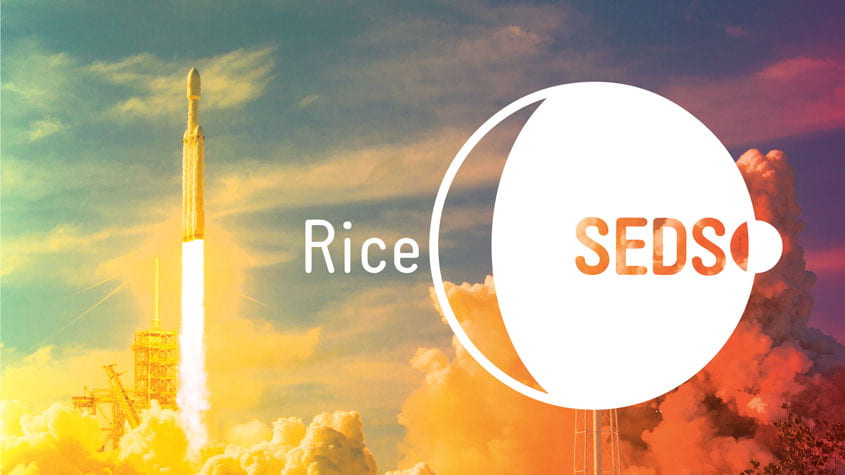On Saturday, March 6th, 2021, on a Virtual Platform, SEDS Rice is hosting the 3rd Owls in Space Symposium with Keynote Speaker NASA Johnson Space Center Deputy Director Vanessa Wyche. The 2021 Owls in Space Symposium is hosted by SEDS Rice and Rice Eclipse and in partnership with the Rice Space Institute. The Symposium is hosted by students for students to engage with space culture and industry. The Symposium supports SEDS Rice’s purpose to empower undergraduate and graduate students to explore and engage in space disciplines both at Rice and abroad.
Additional Information:
- The event is free and open to the public.
- Dress is business casual.
- Please arrive ten minutes early to each session.
- This event is about space education, engagement, and careers; therefore, there will be a networking and career fair section of the event.
- Meet new people, make long lasting connections, and have fun!
Event Schedule:
- 1:00 – 1:35 PM – Keynote Speaker NASA JSC Deputy Director Vanessa Wyche
- 1:45 – 2:30 PM – Space Education, Awareness, and Inspiring the Next Generation Panel
- 2:40 – 3:25 PM – Space in the 2030s & 2040s Panel
- 3:30 – 4:00 PM – Fireside Chat with Special Guest Astronaut Michael López-Alegría
- 3:30 – 5:30 PM – Networking and Career Fair
- 6:00 – 8:00 PM – Space Virtual Happy Hour
Space Education, Awareness, and Inspiring the Next Generation Panelists:
- Shelli Brunswick, Space Foundation Chief Operating Officer
- Harper Cheyenne, SEDS-USA Vice Chair
- Kaci Heins, Space Center Houston Space Center University® Director
- Dr. Kirsten Siebach, Rice University Department of Earth, Environmental and Planetary Sciences Assistant Professor
Space in the 2030s & 2040s Panelists:
- Dr. Leroy Chiao, Rice University Department of Mechanical Engineering Lecturer and Former NASA Astronaut
- Dr. Stanley Love, NASA Johnson Space Center Management Astronaut
- Tammy Radford ’05, Oceaneering Space Systems Senior Engineer
- Dr. Franklin Chang-Diaz, Ad Astra Rocket Company Chief Executive Officer and Former NASA Astronaut
- Dr. Robert Behnken, NASA Astronaut
Companies in attendance:
- Lockheed Martin
- Space Center Houston
- Lunar and Planetary Institute
- Johns Hopkins Applied Physics Laboratory
- Ad Astra Rocket Company
- Analytical Graphics, Inc.
- SpaceFund
- BAE Systems
- First Mode
- NASA Jet Propulsion Laboratory
- NASA Johnson Space Center
- Limitless Space Institute, Inc.
- The Zed Factor Fellowship
- AEXA Aerospace
- Axiom Space
- Additional Companies launching soon!
Keynote Speaker: Vanessa Wyche, NASA JSC Deputy Director
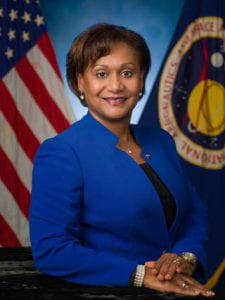
Vanessa E. Wyche is deputy director of NASA’s Johnson Space Center (JSC), an organization of nearly 10,000 civil service and contractor employees in Houston and White Sands Test Facility in Las Cruces, New Mexico. She assists with leadership of a broad range of human spaceflight activities, including NASA’s astronauts, Mission Control, development and operation of human spacecraft in low-Earth orbit and plans for human missions to the Moon and Mars.
Prior to her position as deputy director, Wyche served as the director of the Exploration Integration and Science Directorate at JSC where she provided executive guidance and direction of a multi-disciplined organization to enable human and robotic exploration of deep space. Wyche previously served as acting deputy director of JSC from September 2017 to February 2018.
A native of South Carolina, Vanessa earned a Bachelor of Science in Engineering and Master of Science in Bioengineering from Clemson University.
Before joining JSC in 1989, she worked for the Food and Drug Administration in Washington D.C. Throughout the span of her career with NASA, she has held several other distinguished leadership positions including: assistant director of JSC; flight manager of several missions of the retired Space Shuttle Program, executive officer in the Office of the NASA Administrator and led center-level technical and program organizations.
A strong supporter of Innovation and Inclusion (I&I) at JSC, Wyche has served as a member of JSC’s I&I Council and co-executive sponsor of “Emerge,” an employee resource group for early career employees. She advocates mentoring and is a passionate promoter of science, technology, engineering and math (STEM).
Wyche serves on multiple boards, including chair of Space Center Houston, and advisory board member of Houston Exponential, SpaceCom and the NASA College Scholarship Foundation.
She has received numerous honors from NASA, notably, two Outstanding Leadership Medals, two Achievement Medals, and is a 2014 Women at NASA awardee. She has been recognized externally as a national “2016 Women Worth Watching” honoree by Profiles in Diversity Journal, a 2017 “Inspiring Woman from South Carolina” by Coastal Carolina University, and was inducted into the Thomas Green Clemson Academy of Engineers and Scientists at Clemson University in 2019.
Follow Wyche on Twitter at twitter.com/V_Wyche.
Fireside Chat Special Guest: Michael López-Alegría, Axiom Space Vice President of Business Development and Commander of First Private Spaceflight
 Michael López-Alegría has over 40 years of aviation and space experience with the U.S. Navy and NASA in a variety of roles including Naval Aviator, engineering test pilot and program manager, NASA astronaut, and International Space Station commander.
Michael López-Alegría has over 40 years of aviation and space experience with the U.S. Navy and NASA in a variety of roles including Naval Aviator, engineering test pilot and program manager, NASA astronaut, and International Space Station commander.
He is a four-time astronaut, having flown on Space Shuttle missions STS-73, STS-92, and STS- 113, and serving as Commander of ISS Expedition 14 (flying to and from the ISS aboard Soyuz TMA-9). He holds NASA records for most Extravehicular Activities (EVA) or “space walks” (10) and cumulative EVA time (67 hours 40 minutes).
López-Alegría is the former President of the Commercial Spaceflight Federation, where he was a spokesman, thought leader and advocate with the U.S. Congress and pertinent Executive Agencies for favorable public policy on behalf of the commercial spaceflight industry. He serves on several advisory boards and committees of public and private organizations, including the Human Exploration and Operations Committee of the NASA Advisory Council and the Commercial Space Transportation Advisory Committee to the FAA.
López-Alegría is the Chairman of ASTM International’s Committee on Commercial Spaceflight as well as the President of the Association of Space Explorers USA, a professional and educational organization of current and former astronauts. He is based in Washington, DC.
Space Education, Awareness, and Inspiring the Next Generation Panelists
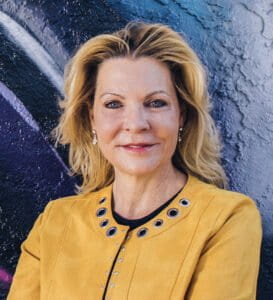 Shelli Brunswick, Space Foundation Chief Operating Officer
Shelli Brunswick, Space Foundation Chief Operating Officer
As Space Foundation’s Chief Operating Officer, Brunswick serves as a corporate officer, and is responsible for Space Foundation operations, facilities, and processes. Functions reporting to her include education, development/philanthropy, marketing and communication, operations, customer service, information technology, facilities, maintenance, security, and assurance. She has primary responsibility for Space Foundation headquarters, the Space Foundation Discovery Center, operational management of the annual Space Symposium and the Faga Forum on Space Intelligence, and she serves as executive leader of the Center for Innovation and Education, a bold new workforce development initiative. She also oversees government affairs activities in the Washington, D.C., office including relationships with government agencies, other space advocacy organizations and associations, and corporate interests.
Brunswick joined the Space Foundation in 2015 after a distinguished career as an acquisition and program management professional for the United States Air Force, and her role as a key leader within the Air Force Congressional Liaison office working both within the Pentagon and on Capitol Hill. She was Defense Acquisition Workforce Improvement Act (DAWIA) certified in Program Management Level III, Financial Manager Level II, and a certified Space Professional Level III by the United States Air Force Space Professional Functional Authority.
As a leading role model for women in space, Brunswick speaks at organizations and events around the globe to advance space innovation partnership and collaboration opportunities. Brunswick currently is the Chair of the WIA Foundation and previously served as the Chair of Women in Aerospace (WIA) from 2016–2019. She is one of 35 women from around the world selected as a Space4Women Network Mentor, which is part of the United Nations Office for Outer Space Affairs (UNOOSA). As a mentor, Brunswick shares her expertise, knowledge, and experiences to build environments where women and girls can take their place as active and equal participants in space science, technology, innovation, and exploration efforts. Throughout her career, Brunswick has dedicated considerable time and energy to increasing the leadership capabilities and visibility of women in the aerospace community.
In addition to these endeavors, Brunswick serves on the board of directors for Manufacturer’s Edge, strengthening the competitiveness of manufacturers through coaching, training, and collaboration-focused industry programs, and by leveraging government, university, and economic development partnerships. She was elected to the Board of Directors of the Colorado Springs Chamber of Commerce & Economic Development Corporation, providing strategic, mission-based leadership and governance. Formerly, she was a board member for the National Defense Industrial Association (NDIA) Rocky Mountain Chapter.
Brunswick graduated summa cum laude from the University of Southern Colorado with a bachelor’s degree in business administration and earned a master’s degree in business administration from the University of Phoenix. She is a Certified Project Management Professional through Project Management Institute and was a Professor of Acquisition Management at Defense Acquisition University.
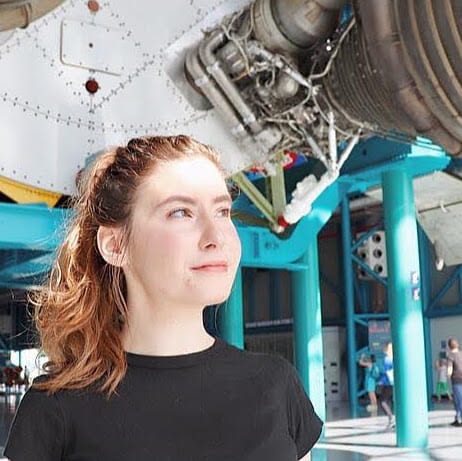 Harper Cheyenne, SEDS-USA Vice Chair
Harper Cheyenne, SEDS-USA Vice Chair
Harper is the current Vice Chair and previous Internal Manager of Diversity and Inclusion for SEDS-USA. At the University of Central Florida, Harper is a senior student of Marketing, Finance, and Physics. Her current research involves rethinking Lunar rover wheels to collect spectral regolith data. Ultimately, she aspires to bridge connectivity gaps between teams within the aerospace industry. As a speaker and an artist, science communication and the growth of STEAM within the realm of new space are passions – start a conversation!
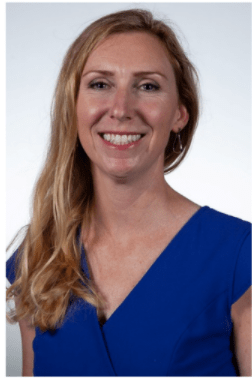 Kaci Heins, Space Center Houston Space Center University® Director
Kaci Heins, Space Center Houston Space Center University® Director
Kaci Heins has a combined 15 years of experience in both formal and informal education. Currently, she oversees Space Center University®, overnight experiences, Stars & STEM, and Explorer Camps for the nonprofit science and space exploration learning center Space Center Houston, which she joined in 2016.
The center continues to develop new, immersive learning experiences to engage people of all ages in science, technology, engineering and mathematics (STEM). More than 250,000 educators and students from around the world go to the center annually.
Her academic experience includes teaching students grades 3rd through 7th with a passion to inspire students to pursue careers in science, technology, engineering and mathematics.
Heins has flown two student experiments on the Zero G plane through the Reduced Gravity Office at NASA Johnson Space Center in Houston and worked aboard the research ship in the National Oceanic And Atmospheric (NOAA) Teacher at Sea Program in Rainier, Alaska.
She has been awarded numerous grants benefiting her students and for three consecutive years raised funds totaling more than $30,000 through the DonorsChoose.org STEM Lab, formally W. L. Gore STEM Grant, to send student experiments to the International Space Station through the Student Spaceflight Experiment Program. Other notable grants awarded include the National Weather Association Grant, the Captain Planet Foundation Grant, and the NASA Summer of Innovation in Robotics.
Heins’ many awards include the 2020 Alan Shepard Technology in Education Award from the Astronauts Memorial Foundation, Space Foundation and NASA, Arizona Science Teachers Association Middle School Teacher of the Year (2015), American Institute for Aeronautics and Astronautics Educator Achievement Award (2015), Flagstaff STEM City Teacher of the Year (2014), Air Force Association National Aerospace Teacher of the Year Award (2014), and Air Force Association Arizona Teacher of the Year Award (2014).
She holds a Master of Arts in secondary education and a Bachelor of Science in elementary education from Southeast Missouri State University.
 Dr. Kirsten Siebach, Rice University Department of Earth, Environmental and Planetary Sciences Assistant Professor
Dr. Kirsten Siebach, Rice University Department of Earth, Environmental and Planetary Sciences Assistant Professor
Kirsten Siebach is an Assistant Professor in the Rice University Department of Earth, Environmental, and Planetary Sciences and calls herself a Martian Geologist. She researches “source-to-sink” sedimentary processes on Mars and early Earth to interpret the history of water and surface environments early in our solar system. She is currently a member of the Science and Operations Teams for the Mars Science Laboratory rover Curiosity, and previously worked on the science and engineering teams for the Phoenix Lander and the two Mars Exploration Rovers.
Kirsten completed her Ph.D. in Geology at Caltech with Professor John Grotzinger with a dissertation titled “Formation and Diagenesis of Sedimentary Rocks in Gale Crater, Mars”, and then did postdoctoral research in geochemistry of Martian sediments with Professor Scott McLennan at Stony Brook University. Prior to Caltech, she attended Washington University in St. Louis, where she worked with Professor Ray Arvidson and graduated summa cum laude with a B.A. in Earth & Planetary Science and Chemistry.
She is also actively engaged in promoting education and outreach related to Earth and Planetary science and regularly presents at schools and outreach events. Outside of professional interests, she loves travel and photography (on Earth as well as Mars), and enjoys swimming, hiking, and social dancing.
Space in the 2030s & 2040s Panelists
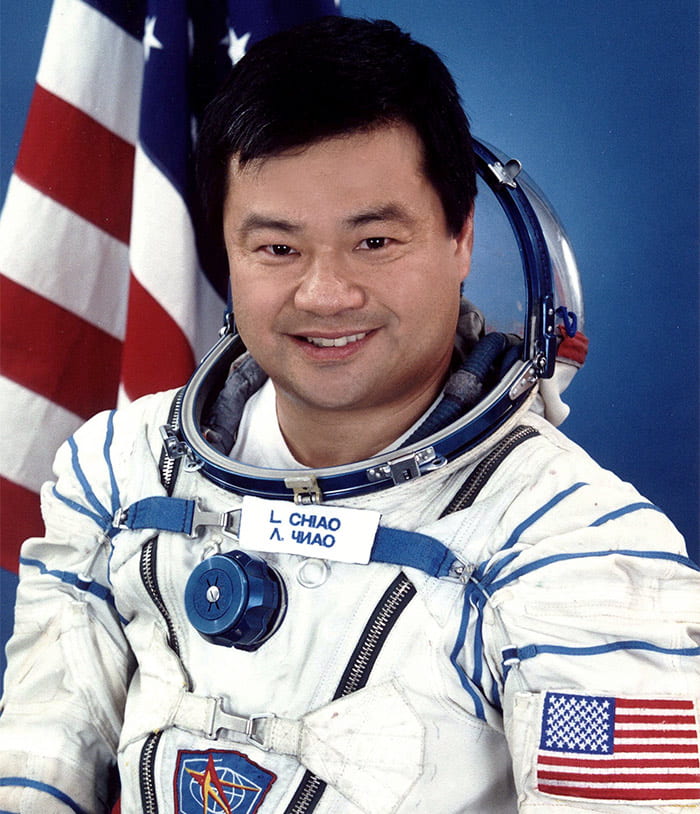 Dr. Leroy Chiao, Rice University Department of Mechanical Engineering Lecturer and Former NASA Astronaut
Dr. Leroy Chiao, Rice University Department of Mechanical Engineering Lecturer and Former NASA Astronaut
Leroy Chiao is a former NASA astronaut and International Space Station commander. He works in business, consulting, and space education. He is a a professional international speaker, and a co-founder and the CEO of OneOrbit, a training & education company. Chiao also holds appointments at Rice University and the Baylor College of Medicine, and is an advisor to the Houston Association for Space and Science Education. He has worked in both government and commercial space programs, and has held leadership positions in commercial ventures and NASA. He was the first LSU Raborn Distinguished Chair Professor. Chiao has extensive experience as a NASA Astronaut and prior to that, as a Research Engineer. Dr. Chiao has served on White House and National Academies committees. He is a fellow of the Explorers Club, and a member of the International Academy of Astronautics and the Committee of 100.
Dr. Chiao left NASA in December, 2005 following a fifteen-year career with the agency. A veteran of four space missions, Dr. Chiao most recently served as Commander and NASA Science Officer of Expedition 10 aboard the International Space Station. He has logged over 229 days in space – over 36 hours of which were spent in Extra-Vehicular Activity (EVA, or spacewalks). In 2009, he served on the White House appointed Review of U.S. Human Spaceflight Plans Committee, and served on a NASA Adv. Council Cmte (2009-2020).
A native English speaker, Dr. Chiao also speaks Mandarin Chinese and Russian. He has flown space missions and worked closely with Russian, Japanese and European Astronauts and their affiliated space agencies. Dr. Chiao is uniquely qualified to speak about the United States, Russian, Japanese, European and Chinese Space Programs. A Space Station Commander and Space Shuttle Mission Specialist, Dr. Chiao was also a certified Co-Pilot of the Russian Soyuz spacecraft. He is an expert in all facets of U.S. and Russian EVA hardware and operations and is EVA certified in U.S. and Russian spacesuits, tools, and training programs. In September 2006, Chiao became the first American to visit the Astronaut Research and Training Center of China. There, he met the first two national Chinese astronauts, Yang Liwei and Fei Junlong.
Dr. Chiao studied Chemical Engineering, earning a Bachelor of Science degree from the University of California at Berkeley in 1983. He continued his studies at the University of California at Santa Barbara, earning his Master of Science and Doctor of Philosophy degrees in 1985 and 1987. Prior to joining NASA in 1990, he worked as a Research Engineer at Hexcel Corp. and then at the Lawrence Livermore National Lab.
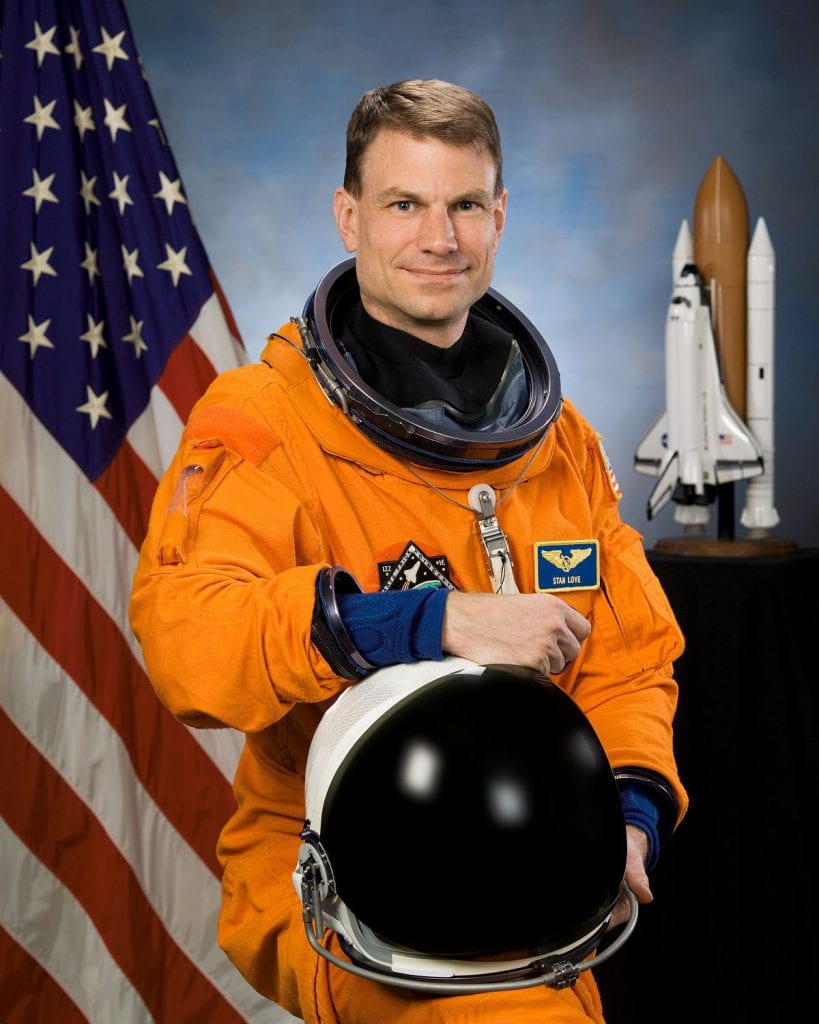 Dr. Stanley Love, NASA Johnson Space Center Management Astronaut
Dr. Stanley Love, NASA Johnson Space Center Management Astronaut
Dr. Stanley G. Love was selected as a NASA astronaut in 1998. He has Master of Science and Doctorate of Philosophy degrees in Astronomy from the University of Washington in Seattle. In 2008, Dr. Love flew aboard STS-122 to deliver and install the European Space Agency’s Columbus module to the station. While onboard, Dr. Love performed two spacewalks to prepare for the installation, add two science payloads, and carry a failed ISS gyroscope to the shuttle for return to Earth. He currently works as the Deputy Chief of the Astronaut Office’s Rapid Prototyping Laboratory, developing cockpit displays and controls for Orion and forthcoming spacecraft.
Dr. Love worked summers at the University of Oregon in Eugene as a computer programming instructor (1984) and as an assistant in physics and chemistry laboratories (1985-1987). As a graduate teaching assistant at the University of Washington in Seattle, beginning in 1987, he taught undergraduate courses in general and planetary astronomy. He was a graduate research assistant at the University of Washington from 1989 to 1993, working on a projects including space propulsion and energy storage, stellar photometry and spectroscopy, analysis of space-exposed surfaces, hypervelocity impact and particle capture, atmospheric entry heating of micrometeoroids, infrared imaging of the zodiacal light, and electron microscopy of interplanetary dust particles. Love moved to the University of Hawaii in Honolulu in 1994 for postdoctoral research on the formation of meteoritic chondrules, the collisional evolution of asteroids, and the possibility of meteorites from the planet Mercury. Love was awarded the O.K. Earl prize postdoctoral fellowship at the California Institute of Technology in 1995. His work there included computational fluid dynamic simulations of asteroid collisions, calibration of the Cassini spacecraft’s dust-particle impact detector, and experimental shock compression of the mineral calcite. Love transferred to the Jet Propulsion Laboratory as a staff engineer in 1997 to work on computer simulations of spacecraft optical instrument systems and to participate in a laboratory-wide process re-engineering effort.
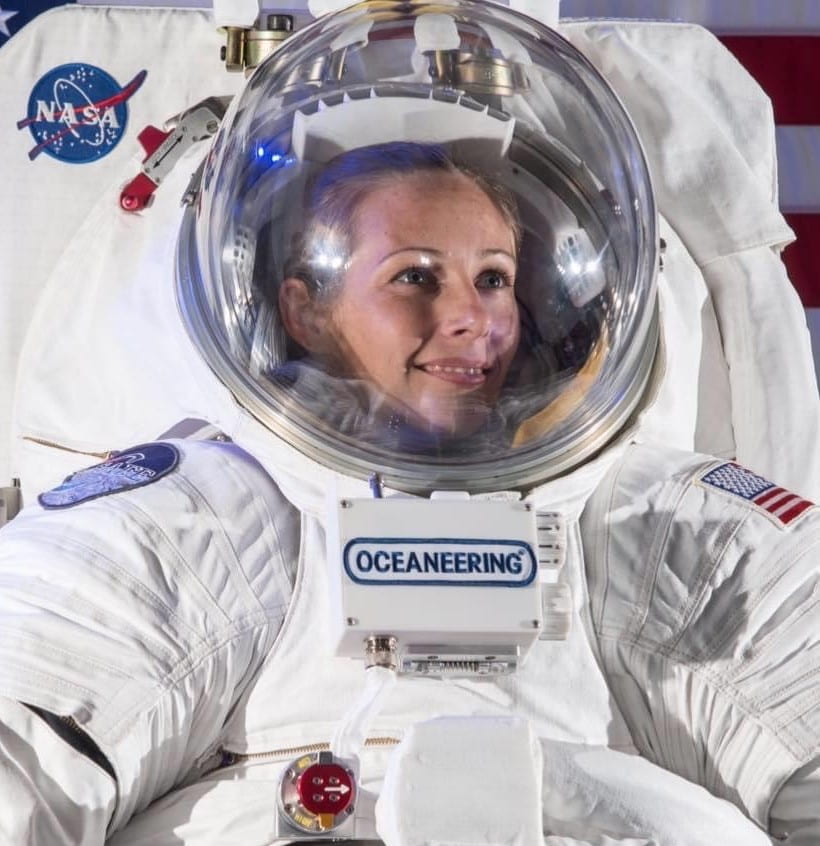 Tammy Radford ’05, Oceaneering Space Systems Senior Engineer
Tammy Radford ’05, Oceaneering Space Systems Senior Engineer
Tammy Radford is a Senior Engineer at Oceaneering Space Systems with 20 years of experience in the aerospace industry. She received her bachelor’s degree in Mechanical Engineering from Purdue University and her master’s degree in Mechanical Engineering from Rice University. She began her career at Boeing as a Design Engineer for the International Space Station and then spent 6 years as a Structural Analyst. After 10 years with Boeing, she went to work for Oceaneering Space Systems on space suit development. Tammy enjoyed applying her background to EVA suit concept development, both as a design engineer and a suit test subject. She also supported the design, build, and test of a flight Tool Changer unit for the DARPA Robotic Servicing of Geosynchronous Satellites (RSGS) Program. She is currently a Portable Life Support System (PLSS) Project Manager for the Exploration Extravehicular Mobility Unit (xEMU).
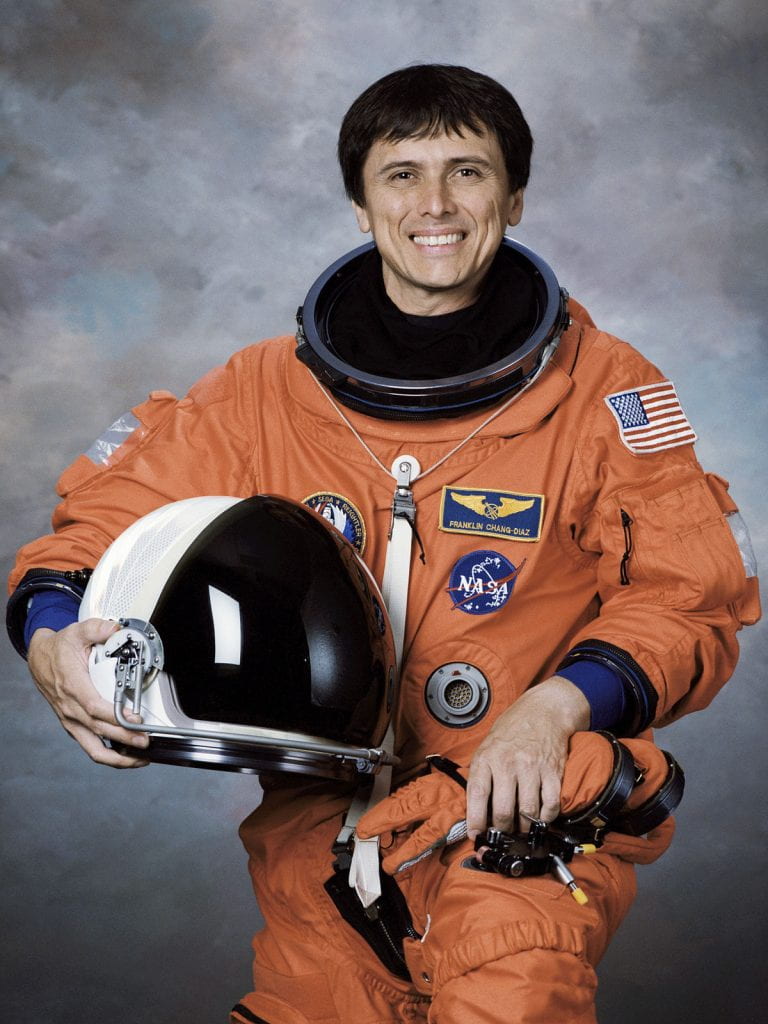 Dr. Franklin Chang-Diaz, Ad Astra Rocket Company Chief Executive Officer and Former NASA Astronaut
Dr. Franklin Chang-Diaz, Ad Astra Rocket Company Chief Executive Officer and Former NASA Astronaut
Ad Astra Rocket Company is a small R&D company doing big things. Founded by Dr. Franklin Chang Díaz, former NASA Astronaut, Plasma Physicist, and inventor of the VASIMR® engine. Our Webster, Texas facility is focused on the development and testing of the Variable Specific Impulse Magnetoplasma Rocket engine or “VASIMR®” engine, an advanced electric plasma propulsion rocket engine with the potential to revolutionize the way we move around in space. The VASIMR® engine is a more efficient and electric alternative to current methods of space travel. It is easily scalable and has the potential to be adapted for both smaller logistical Low Earth Orbit (LEO) and Cislunar missions as well as deep-space missions. Some of the poteinal applications of the VASIMR® engine include satellite maintenance, space debris clean up, cis-lunar transport and large projects such as fast, deep space voyages to places like Mars and beyond!
The VASIMR® engine began as an idea that came to young Chang Díaz during his time at MIT. While in the Astronaut program, he brought the project to NASA and formed the ASPL (Advanced Space Propulsion Laboratory). In 2005 he privatized the project and formed Ad Astra Rocket Company, with support from private investment and a talented team, Chang Díaz and Ad Astra have grown the VASIMR® engine into what it is today. The company has also expanded with a subsidiary in Costa Rica that focuses on implementing hydrogen technology and renewable energy solutions worldwide. Both locations aim to advance transportation solutions both in space and on earth while improving environmental health.
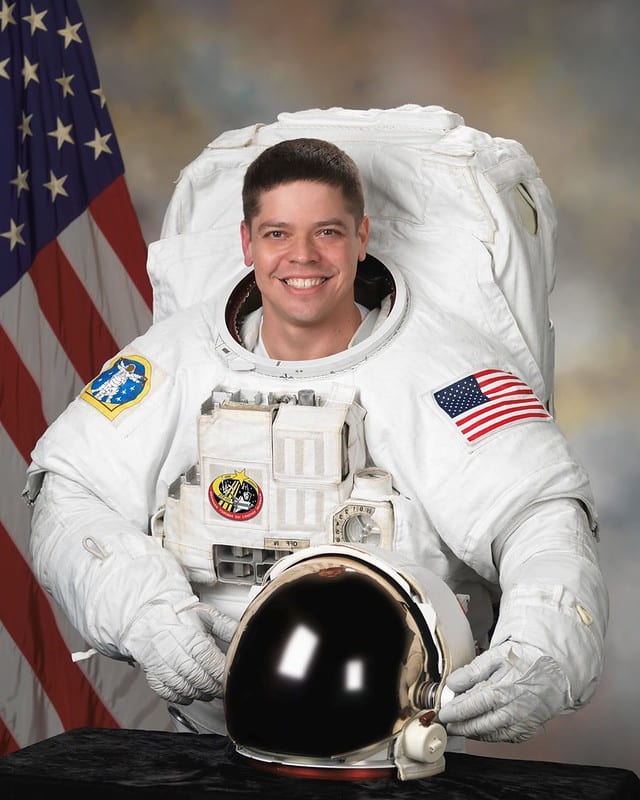 Dr. Robert Behnken, NASA Astronaut
Dr. Robert Behnken, NASA Astronaut
Robert L. Behnken was selected as an astronaut by NASA in 2000 and is a veteran of two space shuttle flights. A native of Missouri, Behnken flew STS-123 in March 2008 and STS-130 in February 2010, logging more than 708 hours in space, and more than 37 hours during six spacewalks. Behnken most recently served as Joint Operations Commander on the first crewed flight of the SpaceX Crew Dragon, the Demo-2 mission, which landed August 2, 2020. He also served as Flight Engineer on the International Space Station for Expedition 63.
Colonel Behnken was selected by NASA in July 2000, and following the completion of astronaut candidate training was assigned to support launch and landing activities at the Kennedy Space Center, Florida. Since then, within the Astronaut Office, he served in the Exploration branch, as Chief of the Space Station Operations Branch, and between July 2012 and July 2015 as NASA’s Chief Astronaut. As Chief Astronaut, he was responsible for flight assignments, mission preparation, and on-orbit support of international space station crews as well as organizing astronaut office support for future launch vehicles.
Colonel Behnken trained as an international space station crew member following the loss of Columbia and as a mission specialist for STS-400 the launch-on-need rescue flight for the last Hubble servicing mission. He flew STS-123 in March 2008 and STS-130 in February 2010, logging more than 708 hours in space, and performing more than 37 hours in six spacewalks. Behnken served as Joint Operations Commander on the first crewed flight of the SpaceX Crew Dragon, the Demo-2 mission, launching May 20 and landing in Pensacola, Florida on August 2, 2020. While on board, Behnken conducted four spacewalks and is now tied for most spacewalks by an American astronaut with Michael Lopez-Alegria, Peggy Whitson, and Chris Cassidy, each of whom has completed 10 spacewalks.
